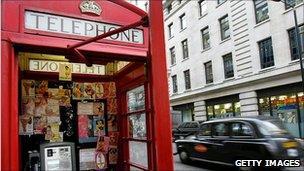2,600 prostitutes were 'trafficked into UK'
- Published

New research shows number of women trafficked for prostitution may be lower than previously thought
At least 2,600 women are working as prostitutes in England and Wales having been trafficked from abroad, research for the police suggests.
A report from the Association of Chief Police Officers (Acpo), external found around half of these women were Chinese.
Acpo said another 9,200 migrant women were thought to be "vulnerable".
London was found to have the highest proportion of migrant sex workers (96%), while in the Yorkshire/Humber region under one-third were foreign.
The figure of 2,600 migrant women trafficked for the purpose of sexual exploitation is a snapshot taken during a 12-month research period.
The estimate is lower than the 4,000 estimate produced by the Home Office in 2003.
Acpo estimated around 30,000 women worked in off-street prostitution in England and Wales and 17,000 of them were from outside the UK.
Many more work in street prostitution but very few of them are believed to have been trafficked.
Acpo has defended its research, saying it is "more robust and comprehensive".
'Overly prescriptive'
The police said the estimate was based on face-to-face interviews with women found to be working in brothels and on police anti-trafficking operations.
The Acpo report found that in addition to the number of women trafficked for prostitution there were a further 9,200 women who were considered "vulnerable migrants". However, researchers could not be certain they had been trafficked.
The report also found half of all victims of trafficking were from China with most of the rest coming from South East Asia and Eastern Europe.
Significant regional differences were evident from the research. In London, 96% of women involved in prostitution are migrants compared to just 32% in Yorkshire and the Humber.
A feminist charity, Eaves, which works with trafficked women, is concerned about how the research was conducted, including what it said was an "overly prescriptive" definition of victims of trafficking.
Abigail Stepnitz, who works for the Eaves Poppy Project, told the BBC News Channel that whilst it is impossible to have a completely accurate picture the real number of trafficked prostitutes is likely to be higher than the police estimate.
'Let down by system'
She said that out of the 9,200 women identified as "vulnerable" the charity believed "a significant percentage" might also be regarded as trafficked.
Amnesty International UK agreed, calling the police figure "a low estimate of the true scale of the problem" and describing anti-trafficking measures as "not fit for purpose".
Its director, Kate Allen, said: "Even when trafficked women are free from their tormentors, the system often lets them down and even treats them as illegal immigrants, rather than as victims of a terrible crime."
Responding to the Acpo report, conducted under the title Project Acumen, Immigration Minister Damian Green said: "In order to combat trafficking more effectively we need to understand it better".
"Having any number of people trafficked into the UK is unacceptable, therefore it is vital that we use Acumen to re-focus our efforts both at targeting the criminal gangs that trade in this human misery and in helping victims escape and recover from their ordeal."